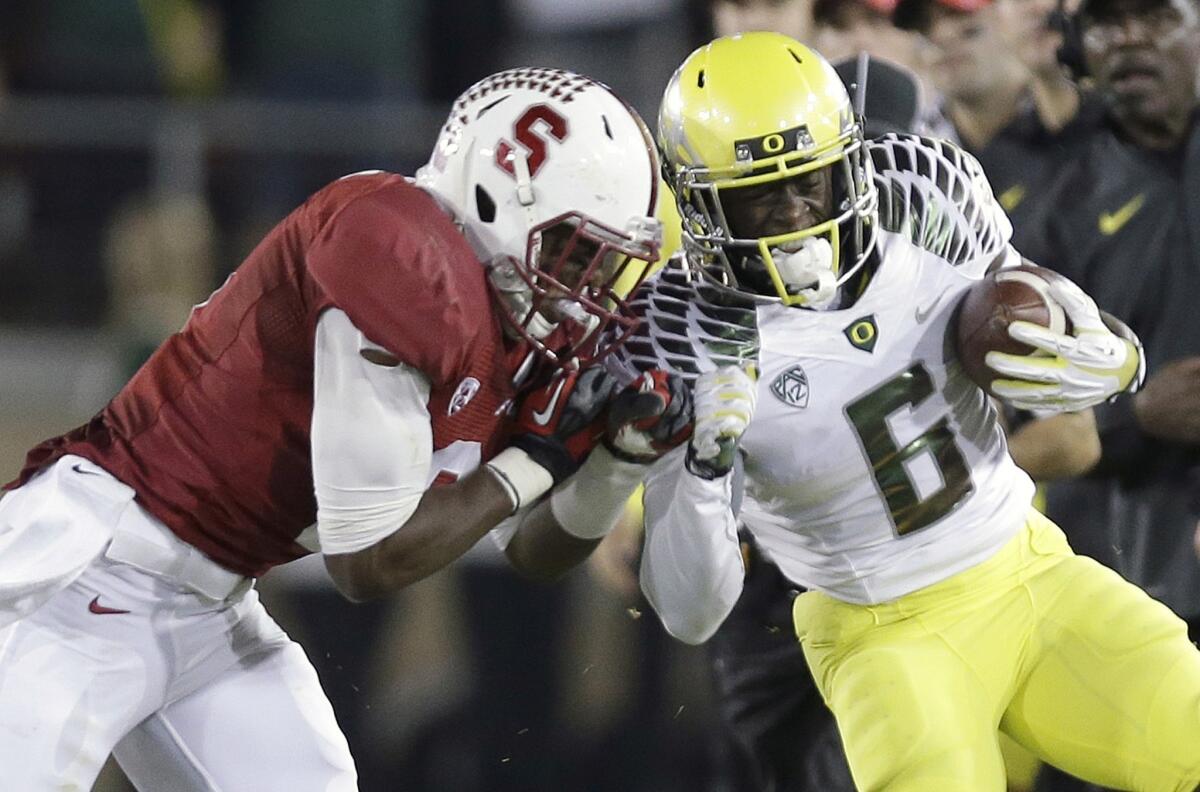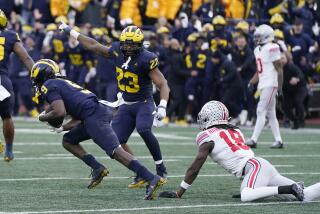End of BCS can’t come soon enough for Pac-12

- Share via
A lot of people hate the Bowl Championship Series, but no conference needs it to go away faster than the Pac-12.
No league has been more tormented by its quartile quirkiness and, at times, outright chicanery.
The BCS would not have been possible without the Pac-12’s cooperation in 1998, when then-Southeastern Conference commissioner Roy Kramer and cohorts persuaded the league and the Rose Bowl to sign on the crooked line.
It meant releasing the Pac-12 and Big Ten champions for a “title” game any time its conference champions finished No. 1 or No. 2.
The BCS/SEC swore the Rose Bowl could keep its traditional Pac vs. Big Ten game every year… except years it might have to take Miami, Nebraska, or Texas Christian.
One season, the Rose Bowl had to put Rutgers on its big board of contenders.
Rose Bowl Chief Executive Mitch Dorger was ready to unveil statistics showing how Los Angeles led the nation in Rutgers alums.
The BCS has worked out tremendously for the SEC, which has garnered nine of the 15 available titles. All six BCS champions outside the SEC had to go undefeated, while the nine BCS champions from the SEC have lost seven total games.
The Pac-12 and Rose Bowl have no one but themselves to blame.
All systems are “fair” if you agree to its rules and loopy loopholes.
The Pac-12’s participation has been a boon financially and helped “grow the sport” nationally in ways few could have imagined.
In terms of Pac-12 football, though, the BCS adventure has been “The Poseidon Adventure.”
In 2001, Oregon finished No. 2 in both polls but got edged out of the title game by Nebraska, fresh off a 62-36 loss at Colorado.
In 2003, USC finished No. 1 in both polls but No. 3 in the BCS standings.
This anomaly was possible because Oklahoma got blown out by Kansas State in the Big 12 title game but still finished No. 1 in the standings.
Everyone knows USC, not Oklahoma, should have played Louisiana State in 2003.
In 2004, No. 5 California was denied its first trip to the Rose Bowl since 1959 because the medicine-bottle BCS fine print mandated that spot go to No. 4 Texas by the margin of .8476 to .8347, whatever that meant.
Voter manipulation and/or fraud may have been involved.
No, next year’s four-team playoff can’t get here soon enough. It’s coming at a time when the Pac-12 is pigskin peaking. The league hasn’t been this good in years and is now generally considered No. 2 behind the SEC.
Next year, playing at this level, the Pac-12 champion will almost assuredly land a spot in the top four.
This year, though, it’s going to mean diddly squat again because the Pac-12 is probably going to get left on the bench.
Stanford’s 26-20 win over Oregon on Thursday night eliminated the Pac-12’s last undefeated team.
Barring a strange next three weeks, an undefeated champion from a far weaker conference is going to earn the bid over the Pac-12 champ.
Oregon’s loss opened the door for Florida State, leader of college football’s fifth-best conference.
Alabama and Florida State are now 1-2 in the latest BCS standings, followed by Ohio State, Stanford and Baylor.
If Florida State stumbles, undefeated Ohio State, from the watered-down Big Ten, will get the bid.
If Alabama and Florida State lose, undefeated Baylor from the wilted Big 12 would probably jump the Pac-12.
This is all perfectly fair and fine. Stanford lost at Utah by six points.
The Cardinal had third and two at the Utah six and elected to pass the ball twice. The other option was handing off to Tyler Gaffney, who carried 45 times in Thursday’s emphatic win over Oregon.
The decision to pass, instead of run, may cost Stanford a shot at the national title.
Again, that’s the way the system crumbles.
At least next year, with the four-team playoff, a selection committee could weigh one goal-line decision in Salt Lake City against Stanford’s larger body of work.
Who knows how many national titles the Pac-12 might have contended for had the four-team playoff started in 1998.
Using the final BCS standings as a guide, No. 4 Washington would have made the playoff in 2000.
Oregon was No. 4 in 2001 and USC was No. 4 in 2002.
Had there been a playoff in 2003, USC would have merely slipped to the No. 3 seeding instead of getting royally hosed.
Stanford, at No. 4, would have made the playoff in 2010 and 2011.
Last year, Oregon finished fourth.
What’s more, in the new system, several Pac-12 schools would have received serious consideration by the selection committee.
Six times in BCS history a Pac-12 school has finished No. 5:
1998: UCLA
2004: Cal
2005: Oregon
2006: USC
2008: USC
2011: Oregon
In 1998, the committee may have placed more importance on UCLA winning the Pac-12 title than a heartbreak loss at Miami.
Kansas State, as good as it was that year, finished No. 3 but lost the Big 12 title to Texas A&M.;
Even Pac-12 schools outside the top five would have garnered consideration.
In 2007, two-loss LSU won the national title after slipping into the No. 2 spot on the final weekend.
Many experts, however, thought Georgia and USC were actually the best two-loss teams at the end.
Georgia finished No. 5 in the BCS and USC finished No. 7.
Last year, the BCS had Oregon at No. 4 and Stanford at No. 6 despite the fact two-loss Stanford won the Pac-12 title and defeated Oregon.
It is highly likely, had there been a selection committee, Stanford would have earned the bid.
So as the final BCS season winds down, Pac-12 lovers need to stoically accept this year’s knife twist of fate and look forward to new beginnings.
Looking back, at least the monster creators can’t take away the Pac-12’s cherished (and only) BCS title of 2004.
Oh wait, yes they did.
More to Read
Go beyond the scoreboard
Get the latest on L.A.'s teams in the daily Sports Report newsletter.
You may occasionally receive promotional content from the Los Angeles Times.











